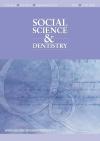Social Science and Dentistry

- Cover Date:
- September 2013
- Print ISSN:
- 2040-4263
- Vol:
- 2
- Issue:
- 2
Pre-operative expectations and recovery outcomes for third molar extraction surgery in Nigeria
Aim: Research on Western patient populations has indicated that patient expectations are important in recovery from third molar extraction (TME). However, little research has been carried out in the Sub-Saharan context. The aim of this study is to extend previous work, and explore the role of patient expectations in recovery from (TME) across a broad range of variables (including analgesic consumption, fear of dental pain and dental anxiety) for adult patients in Nigeria, using the Self Regulatory Model (SRM) as a framework. Design: A prospective questionnaire-based design was employed, which included key SRM variables. Seventy-five Nigerian TME hospital patients were tested at two time points; at pre-operative assessment and at seven days post-TME surgery. Results: There was a strong association between both preoperative expectations and the difference in anticipated and experienced symptoms (r = - 0.82, p < 0.001) and also post-operative expectations and this difference score (r = 0.65, p < 0.001) demonstrating that patients either over-or underestimated the severity of symptoms, and subsequently experienced less or more severe symptoms than anticipated. State anxiety showed the strongest association with the differences in expected and experienced symptoms, rather than trait dental anxiety or fear of dental pain. Discussion: There may be implications for the type and nature of TME pre-operative information provided to Nigerian patients to help facilitate patients having more realistic expectations of surgery. The importance of state anxiety (not dental anxiety) in expectations may be related to TME surgery being carried out in hospital, thus possibly not perceived as a dental procedure per se. Thus, it may be most useful to assess and target state anxiety pre-operatively for this type of surgery. Conclusion: Overall, the SRM was a useful framework to examine preoperative expectations in relation to TME outcome, although it was only moderately successful in predicting outcome. Further research, possibly comparing African and European TME samples, and including clinical data would be worthy of investigation.
Key words: Preoperative expectations, surgical recovery, self-regulatory model, third molar extraction, anxiety
- Article Price
- £15.00
- Institution Article Price
- £
- Page Start
- 88
- Page End
- 94
- Authors
- Heather Buchanan, Arjen van Wijk, Neil Coulson, Whyte Ejedimu, Koula Asimakopoulou
Articles from this issue
- Title
- Pg. Start
- Pg. End
- The Impact of Dental Disease on a sample of Aboriginal adults living in the Central Coast Region of New South Wales Australia
- 73
- 79
- Collecting psychosocial self-report data in oral health research: impact of literacy level and computerised administration
- 80
- 87
- Pre-operative expectations and recovery outcomes for third molar extraction surgery in Nigeria
- 88
- 94
